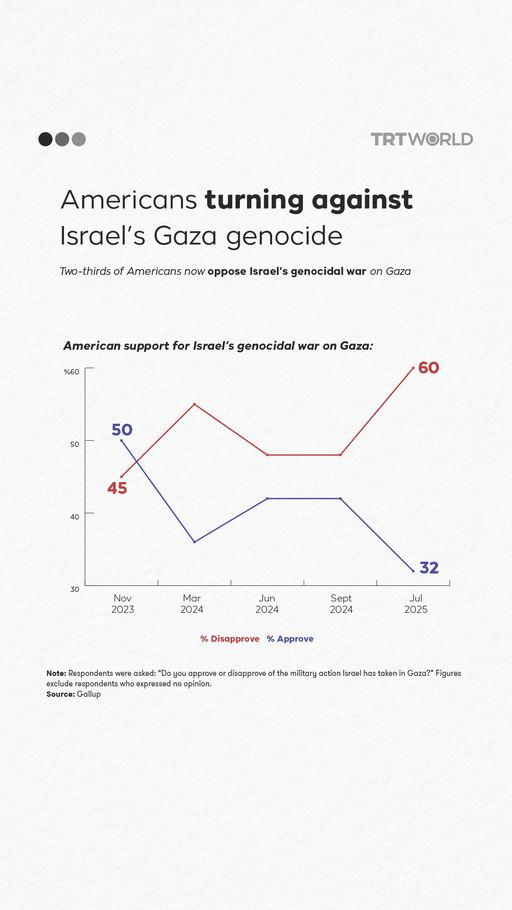Israel is committing a genocide, and with each passing day, more voices are calling it by its name. Nearly two years into Israel’s war on Gaza, a growing number of politicians, legal scholars, and human rights organisations are using the term genocide to describe Israel’s actions.
Since October 2023, Israeli assaults have killed over 60,000 Palestinians in Gaza. The methods of killing are many: air strikes, shelling, the systematic destruction of hospitals and homes, and, increasingly, forced starvation.
Some states, such as Türkiye, South Africa, and much of the Global South, have long described Israel’s actions as genocidal and spoken out consistently.
Others have begun to shift only recently, confronted by the scale of devastation unleashed after October 7, 2023.
Across the Middle East, denunciations have come from Jordan, Iraq, Iran, Lebanon, Syria, Kuwait, Qatar, Oman, Yemen and Saudi Arabia, forming a broad regional consensus.
In Asia, Afghanistan, Pakistan, Kyrgyzstan, Indonesia, Bangladesh, Malaysia, Maldives, and North Korea have spoken out clearly against the genocide.
In Latin America, governments in Cuba, Bolivia, Brazil, Colombia, Nicaragua, Venezuela, Guyana, Brazil, Bolivia, Belize, Chile, and Saint Vincent and the Grenadines have made similar declarations, continuing a tradition of alignment with the Palestinian cause.
Legal reckoning and The Hague
In February 2024, the African Union’s 38th summit issued a communique stating that Israel was committing genocide against the Palestinians and calling for international prosecution.
Several of its member states, Mauritania, Senegal, Algeria, Tunisia, Libya, Egypt, Djibouti, Somalia, Namibia, and South Africa had already reached this conclusion independently.
The most visible legal reckoning is now unfolding in The Hague.
In December 2023, South Africa filed a case against Israel at the International Court of Justice (ICJ), accusing it of violating the Genocide Convention.
To substantiate the case, South Africa has submitted evidence alleging that Israel’s “acts and omissions” are genocidal in nature, claiming they are aimed at destroying a significant portion of the Palestinian national, racial, and ethnic group.
Under international law, genocide is defined as carrying out certain acts with the specific intent to destroy, in whole or in part, a national, ethnic, racial, or religious group.
These acts include the killing of members of the group or causing them serious bodily or mental harm; deliberately creating conditions intended to bring about the group’s physical destruction, in whole or in part; imposing measures designed to prevent births within the group; and forcibly transferring children of the group to another group
The ICJ’s initial response, ordering Israel to prevent acts of genocide and allow humanitarian aid, was significant. Israel’s written defence is expected by 2026, a final judgment years after that.
The states such as Belgium, Norway and Canada have deferred to the Court’s future ruling.
In Europe, Ireland, Spain and Slovenia have explicitly stated that Israel’s actions may constitute genocide. Their stance isolates them from larger EU powers whose support for Israel remains unwavering, or vaguely worded.
Silent ones
The United States, UK, Germany, Hungary, Paraguay and Italy, despite overwhelming evidence, survivor testimonies, UN reports, and mass civilian death, have refused to recognise genocide for what it is. They invoke Israel’s right to self-defence.
Shifting stance?
To date, around 144 of the 193 United Nations member states recognise Palestine as a state. However, only a few of the European Union’s 27 member countries have done so.
Last year, Ireland, Norway, and Spain formally recognised a Palestinian state, based on borders that existed before the 1967 Middle East war, when Israel occupied the West Bank, Gaza, and East Jerusalem.
The first Oslo Accord, signed on 13 September 1993, marked mutual recognition between Israeli and Palestinian leaders and a pledge to end decades of conflict. A second followed in 1995.
The Oslo Accords were intended to pave the way for Palestinian self-determination and the eventual creation of a Palestinian state existing alongside Israel.
Palestine has held non-member observer state status at the UN General Assembly since 2012.




















